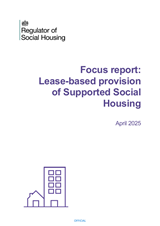Focus Report: Lease-based provision of Supported Social Housing

SSH is where social landlords lease properties on a long-term basis, to provide much-needed specialised housing for people with complex support needs, such as for people with a learning disability, autustic people or people with mental health needs. The ongoing level of support should be similar to that provided in a care home, while enabling people to live independently in the community. This report sets out significant issues that lease-based providers need to address.
SSH is exempt from rent regulation, although the rent on a property must be below market levels if the home is to meet the statutory definition of social housing. To qualify for the SSH exemption, the home must be provided by a private registered provider under an agreement with a local authority or with the NHS and there must have been no or negligible public assistance (other than by way of loan).
Over a number of years, RSH has found significant and ongoing issues with some landlords in this part of the sector. Many have not been well run and have become financially distressed or insolvent when financial risks have crystalised. Where necessary, they have taken action to improve the governance and decision making of some landlords. RSH has also made landlords address severe conflicts of interest, which had resulted in some taking on unfavourable lease terms and unsuitable homes from freeholders.
However, the report reveals that very few lease-based landlords are delivering specialised supported housing in a way that consistently delivers the outcomes in RSH’s standards. It highlights significant issues, including:
- The imbalance of risk and reward between the social landlord that leases the property and the freeholder that owns it. Social landlords generally pay inflation-linked leases for at least 10 years (and often longer), which absorb a large part of their rental income despite carrying substantial responsibility.
- Limited capacity to manage risks, ongoing repairs and maintenance, and void periods when the property is empty and no rent is paid.
- Weak governance, with some boards not understanding the scale of their lease liabilities and not challenging these arrangements at the outset.
- Some landlords taking on a large number of homes without understanding the needs of tenants or the homes they live in. This can lead to poor outcomes for tenants and landlords incorrectly claiming rent exemptions to meet their lease payments.
RSH has concluded that there is generally not enough flexibility in current lease terms for landlords to manage risks effectively. For the model to be sustainable and to protect tenants’ homes, landlords are going to have to address the issues raised in this report and this may need further negotiations with the freeholders.
And, if you found this of interest, check out the current government consultation on the Supported Housing (Regulatory Oversight) Act 2023, running until 15 May 2025.
